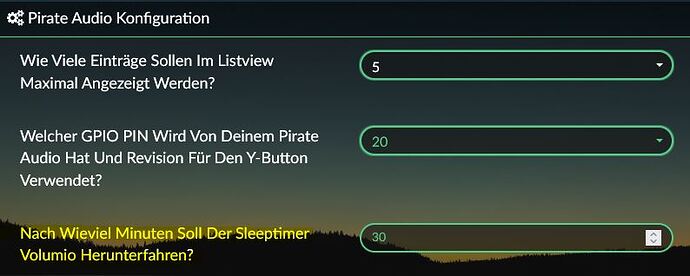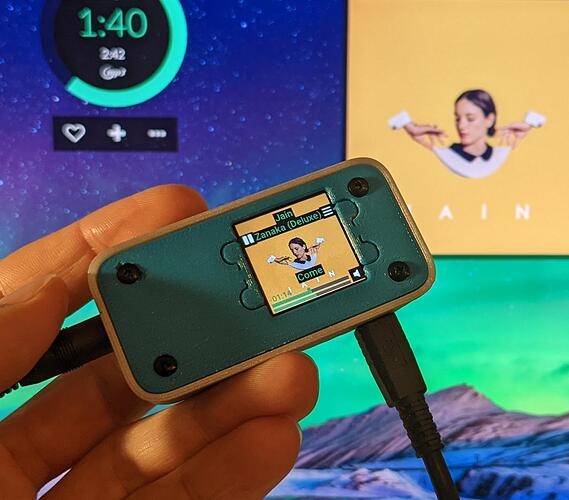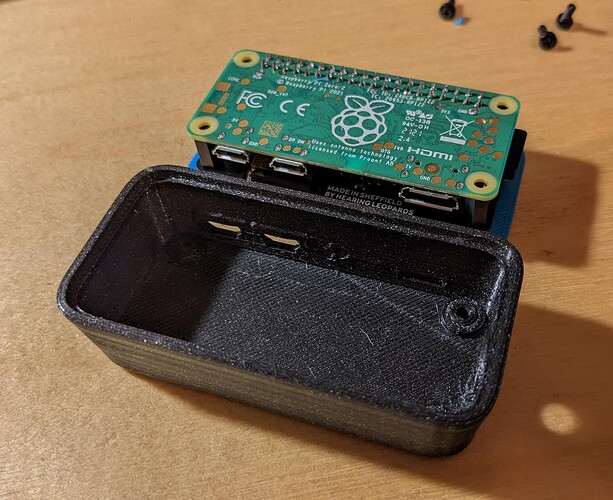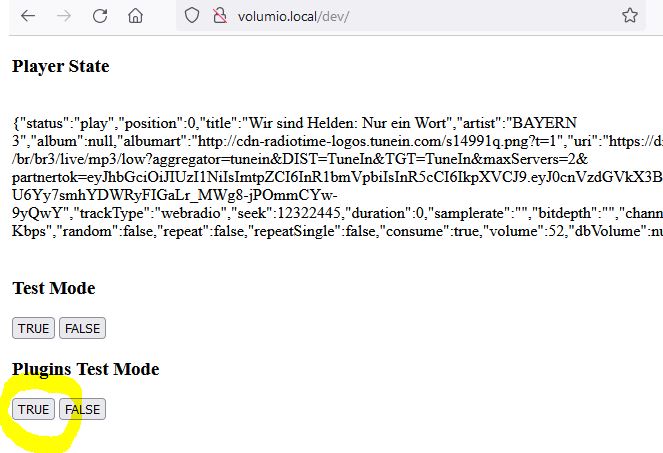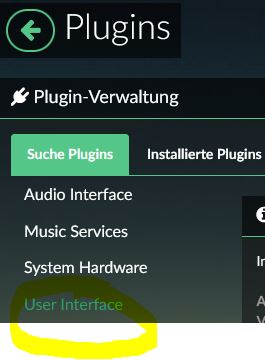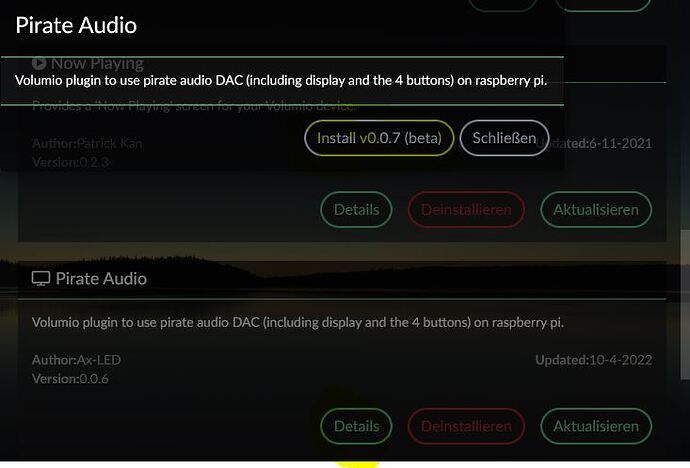Hi,
first of all thank you AxLED and all volumio developers for your amazing work .
I really like what you have created.
My goal is to build a standalone music player.
I am using a raspizero with a pirateaudio headphone module and a UPS module.
I made some modifications to the display.py module to handle seek, next prev and backlight in player mode.
With this modifications it is possible to:
seek + or - by holding down the B or Y buttons
play next or previous track by double clicking on B or Y buttons
change the backlight by holding down the X button, in particular the backlight will be decreased by 20/100 every 0.75 seconds that the user holds down the X button.
I hope this will help someone who asked about the backlight capability.
I used the SW version of PWM so the backlight is not very stable, I will improve it using HW timers.
Greetings
#!/usr/bin/env python3
import time
from PIL import ImageFont, Image, ImageDraw, ImageStat, ImageFilter
from PIL import ImageFilter # v0.0.4
import os
import os.path
#import ST7789 as ST7789
import ST7789 #v0.0.6
from socketIO_client import SocketIO
import requests
from io import BytesIO
from numpy import mean
import sys
import signal
import RPi.GPIO as GPIO
import math
import json
from signal import *
from time import strftime, gmtime # v.0.0.4
import time # v.0.0.4
# import logging
# logging.getLogger('socketIO-client').setLevel(logging.DEBUG)
# logging.basicConfig()
# get the path of the script
script_path = os.path.dirname(os.path.abspath(__file__))
# set script path as current directory
os.chdir(script_path)
# socketIO = SocketIO('localhost', 3000)
# Create ST7789 LCD display class.
disp = ST7789.ST7789(
height=240, #v0.0.6
width=240, #v0.0.6
rotation=90, # Needed to display the right way up on Pirate Audio
port=0, # SPI port
cs=1, # SPI port Chip-select channel
dc=9, # BCM pin used for data/command
backlight=None,
spi_speed_hz=80 * 1000 * 1000,
offset_left=0, #v0.0.6
offset_top=0 #v0.0.6
)
# read json file (plugin values)
with open('/data/configuration/miscellanea/pirateaudio/config.json', 'r') as myfile:
data = myfile.read()
obj = json.loads(data) # parse file
# read json file (volumio language)
with open('/data/configuration/miscellanea/appearance/config.json', 'r') as mylangfile:
data_lang = mylangfile.read()
obj_lang = json.loads(data_lang) # parse file
langcode = obj_lang['language_code']['value']
langpath = '/data/plugins/miscellanea/pirateaudio/i18n/strings_' + langcode + '.json'
if os.path.exists(langpath) is False: # change to en as default language
langpath = '/data/plugins/miscellanea/pirateaudio/i18n/strings_en.json'
# read json file (language file for translation)
with open(langpath, 'r') as mytransfile:
data_trans = mytransfile.read()
obj_trans = json.loads(data_trans) # parse file
WIDTH = 240
HEIGHT = 240
font_s = ImageFont.truetype(script_path + '/fonts/Roboto-Medium.ttf', 20)
font_m = ImageFont.truetype(script_path + '/fonts/Roboto-Medium.ttf', 24)
font_l = ImageFont.truetype(script_path + '/fonts/Roboto-Medium.ttf', 30)
font_fas = ImageFont.truetype(script_path + '/fonts/FontAwesome5-Free-Solid.otf', 28)
bg_default = Image.open('images/default.jpg').resize((240, 240))
albumart, artist, album, title, img_check = '', '', '', '', ''
mode = 'player'
title_queue, len_queue = [], 0 # v.0.0.4
position = '' # v.0.0.4
nav_array_name, nav_array_uri, nav_array_type, nav_array_service = [], [], [], []
marker, listmax, liststart, listresult = 0, int(obj['listmax']['value']), 0, 0
BUTTONS = [5, 6, 16, obj['gpio_ybutton']['value']]
BACKLIGHT = 13
pwm_value = 100
# LABELS = ['A', 'B', 'X', 'Y']
GPIO.setmode(GPIO.BCM) # Set up RPi.GPIO with the "BCM" numbering scheme
GPIO.setup(BACKLIGHT,GPIO.OUT)
pi_pwm = GPIO.PWM(BACKLIGHT,60)
pi_pwm.start(0)
pi_pwm.ChangeDutyCycle(pwm_value)
# exit function (even is service is stopped)
def clean(*args):
#disp.set_backlight(False)
GPIO.cleanup(BACKLIGHT)
GPIO.cleanup(BUTTONS) # v0.0.4
sys.exit(0)
for sig in (SIGABRT, SIGILL, SIGINT, SIGSEGV, SIGTERM):
signal(sig, clean)
# exit function (even is service is stopped)
def on_connect():
# print('connect')
start_time = time.time() # debug, time of code execution
socketIO.on('pushState', on_push_state)
socketIO.emit('getState', '', on_push_state)
socketIO.on('pushBrowseSources', on_push_browsesources)
socketIO.on('pushBrowseLibrary', on_push_browselibrary)
socketIO.on('pushQueue', on_push_queue)
socketIO.emit('getQueue', on_push_queue)
# print("on_connect--- %s seconds ---" % (time.time() - start_time)) # debug, time of code execution
def on_disconnect():
display_stuff('bg_default', obj_trans['DISPLAY']['LOSTCONNECTION'], 0, 0, 'info')
def navigation_handler():
# start_time = time.time() # debug, time of code execution
global mode, nav_array_name, nav_array_uri, nav_array_type, marker, liststart, listresult
if mode == 'player':
mode = 'menu'
emit_action = ['setSleep', {'enabled': 'true', 'time': strftime("%H:%M", gmtime(obj['sleeptimer']['value']*60))}]
nav_array_name = [obj_trans['DISPLAY']['MUSICSELECTION'], 'Sleeptimer ' + str(obj['sleeptimer']['value']) + 'M', obj_trans['DISPLAY']['SHUTDOWN'], obj_trans['DISPLAY']['REBOOT']]
nav_array_uri = ['', emit_action, 'shutdown', 'reboot']
nav_array_type = ['', 'emit', 'emit', 'emit']
listresult = 6
display_stuff('bg_default', nav_array_name, marker, liststart)
else:
print('else navigation_handler() eingetreten')
# print("navigation_handler--- %s seconds ---" % (time.time() - start_time)) # debug, time of code execution
def on_push_browsesources(*args):
# start_time = time.time() # debug, time of code execution
global listresult # v.0.0.4 removed some globals, as thex not needed here
if mode == 'navigation': # v.0.0.4 added, to make sure this getting not displayed on_connect
listresult = len(args[0])
i = 0
append_n = nav_array_name.append # to avoid dots in for loop
append_u = nav_array_uri.append
for i in range(listresult):
append_n(args[0][i]['name'])
append_u(args[0][i]['uri'])
display_stuff('bg_default', nav_array_name, marker, 0)
# print("on_push_browsesources--- %s seconds ---" % (time.time() - start_time)) # debug, time of code execution
def on_push_browselibrary(*args):
# start_time = time.time() # debug, time of code execution
global listresult # v.0.0.4 removed some globals, as thex not needed here
reset_variable('navigation')
listresult = len(args[0]['navigation']['lists'][0]['items']) # v.0.0.4 code cleaning
i = 0
if listresult > 0: # we have item entries
append_s = nav_array_service.append # to avoid dots in for loop
append_t = nav_array_type.append
append_n = nav_array_name.append
append_u = nav_array_uri.append
for i in range(listresult):
if 'service' in args[0]['navigation']['lists'][0]['items'][i]: # v.0.0.4
append_s(args[0]['navigation']['lists'][0]['items'][i]['service']) # v.0.0.4
if 'title' in args[0]['navigation']['lists'][0]['items'][i]: # v.0.0.4
append_n(args[0]['navigation']['lists'][0]['items'][i]['title'])
append_t(args[0]['navigation']['lists'][0]['items'][i]['type'])
if 'uri' in args[0]['navigation']['lists'][0]['items'][i]: # v.0.0.4 spotify check
append_u(args[0]['navigation']['lists'][0]['items'][i]['uri']) # v.0.04
display_stuff('bg_default', nav_array_name, marker, liststart)
elif listresult == 0: # we have no item entries
display_stuff('bg_default', obj_trans['DISPLAY']['EMPTY'], marker, liststart)
# print("on_push_browselibrary--- %s seconds ---" % (time.time() - start_time)) # debug, time of code execution
def reset_variable(varmode):
# start_time = time.time() # debug, time of code execution
global mode, nav_array_service, nav_array_name, nav_array_uri, nav_array_type, marker, liststart, img_check, albumart
mode = varmode
del nav_array_name[:] # v.0.0.4 del is cleaner than = []
del nav_array_uri[:]
del nav_array_type[:]
del nav_array_service[:]
marker, liststart = 0, 0
img_check, albumart = '', '' # reset albumart so display gets refreshed
# print("reset_variable--- %s seconds ---" % (time.time() - start_time)) # debug, time of code execution
def sendtodisplay(img):
# start_time = time.time() # debug, time of code execution
disp.display(img)
# time.sleep(0.1) # ohne sleep 82% CPU, sleep: 0.5 = 40%, 0.25 = 53%, 0.1 = 70%
# print("sendtodisplay--- %s seconds ---" % (time.time() - start_time)) # debug, time of code execution
def display_stuff(picture, text, marked, start, icons='nav'): # v.0.0.4 test for better performance
# start_time = time.time() # debug, time of code execution
global img3, listmax # v.0.0.4
i = 0
if picture == 'bg_default':
img3 = bg_default.copy()
else:
img3 = Image.open(picture).convert('RGBA') # v.0.0.4
draw3 = ImageDraw.Draw(img3, 'RGBA')
if isinstance(text, list): # check if text is array
result = len(text) # count items of list/array
totaltextheight = 0
# Loop for finding out the sum of textheight for positioning, only text to display
listbis = start + listmax
if listbis > result:
listbis = result
for i in range(start, listbis): # v.0.0.4 range max werteliste
len1, hei1 = draw3.textsize(text[0+i], font=font_m)
totaltextheight += hei1
i = 0
y = (HEIGHT // 2) - (totaltextheight // 2)
# Loop for creating text to display
for i in range(start, listbis): # v.0.0.4
len1, hei1 = draw3.textsize(text[0+i], font=font_m)
x2 = (WIDTH - len1)//2
if x2 < 0: # v.0.0.4 dont center text if to long
x2 = 0
if i == marked:
draw3.rectangle((x2, y + 2, x2 + len1, y + hei1), (255, 255, 255))
draw3.text((x2, y), text[0+i], font=font_m, fill=(0, 0, 0))
else:
draw3.text((x2 + 3, y + 3), text[0+i], font=font_m, fill=(15, 15, 15)) # shadow v.0.0.4
draw3.text((x2, y), text[0+i], font=font_m, fill=(255, 255, 255))
y += hei1
else:
result = 1 # needed for right pageindex
len1, hei1 = draw3.textsize(text, font=font_m)
x2 = (WIDTH - len1)//2
y2 = (HEIGHT - hei1)//2
draw3.rectangle((x2, y2, x2 + len1, y2 + hei1), (255, 255, 255))
draw3.text((x2, y2), text, font=font_m, fill=(0, 0, 0))
# draw symbols
if icons == 'nav': # v.0.0.4
draw3.text((0, 50), u"\uf14a", font=font_fas, fill=(255, 255, 255)) # Fontawesome symbols ok
draw3.text((210, 50), u"\uf151", font=font_fas, fill=(255, 255, 255)) # Fontawesome symbols up
draw3.text((0, 170), u"\uf0e2", font=font_fas, fill=(255, 255, 255)) # Fontawesome symbols back
draw3.text((210, 170), u"\uf150", font=font_fas, fill=(255, 255, 255)) # Fontawesome symbols down
elif icons == 'info':
draw3.text((10, 10), u"\uf05a", font=font_fas, fill=(255, 255, 255)) # Fontawesome symbols info
elif icons == 'seek':
draw3.text((210, 50), u"\uf04e", font=font_fas, fill=(255, 255, 255)) # Fontawesome symbols forward
draw3.text((0, 170), u"\uf0e2", font=font_fas, fill=(255, 255, 255)) # Fontawesome symbols back
draw3.text((210, 170), u"\uf04a", font=font_fas, fill=(255, 255, 255)) # Fontawesome symbols backward
page = int(math.ceil((float(marked) + 1)/float(listmax)))
pages = int(math.ceil(float(result)/float(listmax)))
if pages != 1: # only show index if more than one site
pagestring = str(page) + '/' + str(pages)
len1, hei1 = draw3.textsize(pagestring, font=font_m)
x2 = (WIDTH - len1)//2
draw3.text((x2, HEIGHT - hei1), pagestring, font=font_m, fill=(255, 255, 255))
sendtodisplay(img3)
# print("displaystuff--- %s seconds ---" % (time.time() - start_time)) # debug, time of code execution
# position in code is important, so display_stuff works v.0.0.4
display_stuff('bg_default', obj_trans['DISPLAY']['WAIT'], 0, 0, 'info')
socketIO = SocketIO('localhost', 3000)
def seeking(direction):
# start_time = time.time() # debug, time of code execution
global seek, duration
step = 60000 # 60 seconds
if direction == '+':
if int(float((seek + step)/1000)) < duration:
seek += step
socketIO.emit('seek', int(float(seek/1000)))
display_stuff('bg_default', [obj_trans['DISPLAY']['SEEK'], strftime("%M:%S", gmtime(int(float(seek/1000)))) + ' / ' + strftime("%M:%S", gmtime(duration))], 0, 0, 'seek')
else:
if int(float((seek - step)/1000)) > 0:
seek -= step
socketIO.emit('seek', int(float(seek/1000)))
display_stuff('bg_default', [obj_trans['DISPLAY']['SEEK'], strftime("%M:%S", gmtime(int(float(seek/1000)))) + ' / ' + strftime("%M:%S", gmtime(duration))], 0, 0, 'seek')
# print("seeking--- %s seconds ---" % (time.time() - start_time)) # debug, time of code execution
def prevnext(direction):
# start_time = time.time() # debug, time of code execution
global position
if direction == 'prev':
position -= 1
else:
position += 1
if position > len_queue - 1: # set position to first entry to loop through playlist infinite
position = 0
elif position < 0: # set position to last entry to loop through playlist infinite
position = len_queue - 1
display_stuff('bg_default', [str(position + 1) + '/' + str(len_queue), obj_trans['DISPLAY']['PREVNEXT'], title_queue[position]], 1, 0, 'seek')
socketIO.emit('stop')
socketIO.emit('play', {"value": position})
# print("prevnext--- %s seconds ---" % (time.time() - start_time)) # debug, time of code execution
def on_push_queue(*args):
global title_queue, len_queue
# reset variables first
del title_queue[:]
len_queue = 0
if len(args[0]) != 0:
len_queue = len(args[0])
append_t = title_queue.append # to avoid dots in for loop
for i in range(len_queue):
append_t(args[0][i]['name'])
def on_push_state(*args):
# start_time = time.time() # debug, time of code execution
global img, img2, dark, txt_col, str_col, bar_bgcol, bar_col, status, service, volume, albumart, img_check, mode, seek, duration, position
def f_textsize(text, fontsize):
w1, y1 = draw.textsize(text, fontsize)
return w1
def f_drawtext(x, y, text, fontstring, fillstring):
draw.text((x, y), text, font=fontstring, fill=fillstring)
def f_x1(textwidth):
if textwidth <= WIDTH:
x1 = (WIDTH - textwidth)//2
else:
x1 = 0
return x1
def f_content(field, fontsize, top, shadowoffset=1):
if field in args[0]:
if args[0][field] is not None:
w1 = f_textsize(args[0][field], fontsize)
x1 = f_x1(w1)
f_drawtext(x1 + shadowoffset, top + shadowoffset, args[0][field], fontsize, str_col) # shadow
f_drawtext(x1, top, args[0][field], fontsize, txt_col)
# return args[0][field]
volume = int(args[0]['volume'])
position = args[0]['position'] # v.0.0.4
if mode == 'player':
#status = args[0]['status'].encode('ascii', 'ignore')
status = args[0]['status'] # v0.0.6
#service = args[0]['service'].encode('ascii', 'ignore')
service = args[0]['service'] # v0.0.6
# if args[0]['albumart'].encode('ascii', 'ignore') != albumart: # Load albumcover or radio cover (and only if changes)
if args[0]['albumart'].encode('ascii', 'ignore').decode('utf-8') != albumart: #v0.0.6 # Load albumcover or radio cover (and only if changes)
# albumart = args[0]['albumart'].encode('ascii', 'ignore')
albumart = args[0]['albumart'].encode('ascii', 'ignore').decode('utf-8') #v0.0.6
print('Albumart', albumart) #v0.0.6
albumart2 = albumart
if len(albumart2) == 0: # to catch a empty field on start
albumart2 = 'http://localhost:3000/albumart'
if 'http' not in albumart2:
albumart2 = 'http://localhost:3000'+args[0]['albumart']
response = requests.get(albumart2)
# img = Image.open(BytesIO(response.content)) # v.0.04 gab bei spotify probleme
img = Image.open(BytesIO(response.content)).convert('RGBA') # v.0.04 gab bei spotify probleme
img = img.resize((WIDTH, HEIGHT))
img = img.filter(ImageFilter.BLUR) # Blur
draw = ImageDraw.Draw(img, 'RGBA')
# draw = ImageDraw.Draw(img) # v.0.04 gab bei spotify probleme
img2 = img.copy()
# Light / Dark Symbols and bars, depending on background
im_stat = ImageStat.Stat(img)
im_mean = im_stat.mean
mn = mean(im_mean)
txt_col = (255, 255, 255)
str_col = (15, 15, 15) # v0.0.4 needed for shadow
bar_bgcol = (200, 200, 200)
bar_col = (255, 255, 255)
dark = False
if mn > 175:
txt_col = (55, 55, 55)
str_col = (200, 200, 200) # v0.0.4 needed for shadow
dark = True
bar_bgcol = (255, 255, 255)
bar_col = (100, 100, 100)
if mn < 80:
txt_col = (200, 200, 200)
else: # if albumart didnt change, copy the last unpasted version
img = img2.copy()
draw = ImageDraw.Draw(img, 'RGBA')
# paste button symbol overlay in light/dark mode
if status == 'play':
# draw.text((4, 53), u"\uf04C", font=font_fas, fill=txt_col) # Fontawesome symbol pause
f_drawtext(4, 53, u"\uf04C", font_fas, txt_col)
else:
# draw.text((4, 53), u"\uf04b", font=font_fas, fill=txt_col) # Fontawesome symbol play
f_drawtext(4, 53, u"\uf04b", font_fas, txt_col)
# draw.text((210, 53), u"\uf0c9", font=font_fas, fill=txt_col) # Fontawesome symbol menu
f_drawtext(210, 53, u"\uf0c9", font_fas, txt_col)
# draw.text((210, 174), u"\uf028", font=font_fas, fill=txt_col) # Fontawesome symbol speaker
f_drawtext(210, 174, u"\uf028", font_fas, txt_col)
f_content('artist', font_m, 7, 2) # 'artist', font_m
f_content('album', font_m, 35, 2)
f_content('title', font_l, 105, 2) # falscher top wert
# volume bar
vol_x = int((float(args[0]['volume'])/100)*(WIDTH - 33))
draw.rectangle((5, 184, WIDTH-34, 184 + 8), bar_bgcol) # background
draw.rectangle((5, 184, vol_x, 184 + 8), bar_col)
# time bar
if 'duration' in args[0]:
duration = args[0]['duration'] # seconds
if duration != 0:
# if 'seek' in args[0]:
if 'seek' in args[0] and args[0]['seek'] is not None: # v0.0.4 sometime seek = null or None
seek = args[0]['seek'] # time elapsed seconds
# if seek != 0: # v0.0.4 seek=0 is ok to show
el_time = int(float(args[0]['seek'])/1000)
du_time = int(float(args[0]['duration']))
dur_x = int((float(el_time)/float(du_time))*(WIDTH-10))
draw.rectangle((5, 230, WIDTH-5, 230 + 8), bar_bgcol) # background
draw.rectangle((5, 230, dur_x, 230 + 8), bar_col)
# v0.0.4 show remaining time of track
remaining = '-' + strftime("%M:%S", gmtime(duration - int(float(seek)/1000)))
# w4, y4 = draw.textsize(remaining, font_m)
w4 = f_textsize(remaining, font_m)
# draw.text((WIDTH - w4 - 2 + 2, 206 - 2 + 2), remaining, font=font_m, fill=str_col) # shadow, fill by mean
f_drawtext(WIDTH - w4 - 2 + 2, 206 - 2 + 2, remaining, font_m, str_col) # shadow, fill by mean)
# draw.text((WIDTH - w4 - 2, 206 - 2), remaining, font=font_m, fill=txt_col) # fill by mean
f_drawtext(WIDTH - w4 - 2, 206 - 2, remaining, font_m, txt_col) # fill by mean)
# display only if img changed
if img_check != img:
img_check = img
sendtodisplay(img)
# print("on_push_state--- %s seconds ---" % (time.time() - start_time)) # debug, time of code execution
img = Image.new('RGBA', (240, 240), color=(0, 0, 0, 25))
draw = ImageDraw.Draw(img, 'RGBA')
socketIO.once('connect', on_connect)
socketIO.on('disconnect', on_disconnect)
def handle_button(pin):
# start_time = time.time() # debug, time of code execution
global mode, marker, liststart,position, pwm_value, seek, duration # v.0.0.4
browselibrary = False
step = 30000 # 30 seconds
if pin == 5: # Button A, only needs single press function
print("Button 5 service:", service)
if mode == 'player':
if (status == 'play') and (service == 'webradio'):
socketIO.emit('stop')
elif (status == 'play'):
socketIO.emit('pause')
else:
socketIO.emit('play')
elif mode == 'navigation':
if len(nav_array_uri) != 0:
if len(nav_array_type) == 0:
browselibrary = True
else:
if nav_array_type[marker] == 'song' or nav_array_type[marker] == 'webradio' or nav_array_type[marker] == 'mywebradio': # v.0.0.4 fix for mywebradio
socketIO.emit('replaceAndPlay', {"service": nav_array_service[marker], "type": nav_array_type[marker], "title": nav_array_name[marker], "uri": nav_array_uri[marker]})
reset_variable('player')
elif nav_array_type[marker] == 'playlist' and nav_array_service[marker] == 'mpd': # v.0.0.4 modified because of spotifiy
socketIO.emit('playPlaylist', {'name': nav_array_name[marker]})
reset_variable('player')
elif nav_array_type[marker] == 'playlist' and nav_array_service[marker] == 'spop': # v.0.0.4 condition added because of spotifiy
socketIO.emit('stop') # v.0.0.4 fix otherwise change from any playing source to spotify dont work
time.sleep(2) # v.0.0.4 fix otherwise change from any playing source to spotify dont work
socketIO.emit('replaceAndPlay', {"service": nav_array_service[marker], "type": nav_array_type[marker], "title": nav_array_name[marker], "uri": nav_array_uri[marker]})
reset_variable('player')
elif 'folder' in nav_array_type[marker]:
if nav_array_service[marker] == 'podcast':
display_stuff('bg_default', obj_trans['DISPLAY']['WAIT'], marker, liststart) # note, please wait
browselibrary = True
elif 'radio-' in nav_array_type[marker]: # the minus (-) is important, otherwise i cant decide between 'radiofolder' and 'webradiostream'
browselibrary = True
elif 'streaming-' in nav_array_type[marker]:
browselibrary = True
else:
display_stuff('bg_default', obj_trans['DISPLAY']['NOTSUPPORTED'], marker, liststart)
if browselibrary is True:
# replace "mnt/" in uri through "music-library/", otherwise calling them dont work (at least in favourites)
uri = nav_array_uri[marker]
uri = uri.replace('mnt/', 'music-library/')
socketIO.emit('browseLibrary', {'uri': uri})
browselibrary = False
else:
reset_variable('player')
socketIO.emit('getState', '', on_push_state)
elif mode == 'menu':
# socketIO.emit('getQueue', on_push_queue) # refresh variables of queue
if nav_array_type[marker] == 'emit':
if 'setSleep' in nav_array_uri[marker][0]:
socketIO.emit(nav_array_uri[marker][0], nav_array_uri[marker][1])
display_stuff('bg_default', obj_trans['DISPLAY']['SETSLEEPTIMER'], 0, 0, 'info')
#disp.set_backlight(False)
pwm_value = 0
pi_pwm.ChangeDutyCycle(pwm_value)
else:
socketIO.emit(nav_array_uri[marker])
display_stuff('bg_default', ['executing:', nav_array_uri[marker]], 0, 0, 'info')
elif nav_array_type[marker] == 'seek': # v.0.0.4
mode = 'seek'
display_stuff('bg_default', obj_trans['DISPLAY']['SEEK'], 0, 0, 'seek')
elif nav_array_type[marker] == 'prevnext': # v.0.0.4
socketIO.emit('getQueue', on_push_queue) # refresh variables of queue
mode = 'prevnext'
display_stuff('bg_default', [str(position + 1) + '/' + str(len_queue), obj_trans['DISPLAY']['PREVNEXT'], title_queue[position]], 1, 0, 'seek')
else: # browsesource
reset_variable('navigation')
socketIO.emit('getBrowseSources', '', on_push_browsesources)
else:
reset_variable('player')
socketIO.emit('getState', '', on_push_state)
if pin == 6: # Button B, needs a pressed function in player mode
if mode == 'player':
tic = time.perf_counter()
#toc = tic
while not GPIO.input(6):
toc = time.perf_counter()
if toc - tic > 0.5 :
##prevnext('prev')
#position -= 1
#if position < 0: # set position to last entry to loop through playlist infinite
# position = len_queue - 1
#socketIO.emit('stop')
#socketIO.emit('play', {"value": position})
if int(float((seek - step)/1000)) > 0:
seek -= step
socketIO.emit('seek', int(float(seek/1000)))
time.sleep(0.25)
if toc - tic < 0.25 and volume > 0 :
socketIO.emit('volume', '-')
elif toc - tic < 0.5 :
position -= 1
if position < 0: # set position to last entry to loop through playlist infinite
position = len_queue - 1
socketIO.emit('stop')
socketIO.emit('play', {"value": position})
# while not GPIO.input(6) and volume > 0: # limit/exit at volume 0 so amixer dont go crazy
# socketIO.emit('volume', '-')
# time.sleep(0.5)
elif mode == 'navigation' or mode == 'menu' or mode == 'seek' or mode == 'prevnext':
reset_variable('player')
socketIO.emit('getState', '', on_push_state)
if pin == 16: # Button X, needs a pressed function in navigation and menu mode
if mode == 'player':
tic = time.perf_counter()
toc = tic
while not GPIO.input(16):
toc = time.perf_counter()
if toc - tic > 0.75 :
#disp.set_backlight(False)
pwm_value -= 20
if pwm_value < 0 :
pwm_value = 100
pi_pwm.ChangeDutyCycle(pwm_value)
#disp.set_pwm_backlight(50)
time.sleep(0.25)
if toc - tic < 0.5 :
navigation_handler()
#disp.set_backlight(True) # v.0.0.4
if pwm_value < 10:
pwm_value = 100
pi_pwm.ChangeDutyCycle(pwm_value)
elif mode == 'navigation' or mode == 'menu':
while not GPIO.input(16):
marker -= 1 # count minus 1
if marker < 0: # blaettere nach oben durch
marker = listresult - 1
if listresult > listmax - 1: # dann aendere auch noch den liststart
liststart = int(liststart + (math.floor(listresult/listmax)*listmax))
liststart = int(math.floor(marker/listmax)*listmax) # definiert das blaettern zur naechsten Seite
display_stuff('bg_default', nav_array_name, marker, liststart)
elif mode == 'seek': # v.0.0.4
seeking('+')
elif mode == 'prevnext': # v.0.0.4
prevnext('next')
if pin == BUTTONS[3]: # Button Y, needs a pressed function in all modes
if mode == 'seek':
seeking('-')
elif mode == 'prevnext':
prevnext('prev')
elif mode == 'player':
tic = time.perf_counter()
#toc = tic
while not GPIO.input(BUTTONS[3]):
toc = time.perf_counter()
if toc - tic > 0.5 :
##prevnext('next')
#position += 1
#if position > len_queue - 1: # set position to first entry to loop through playlist infinite
# position = 0
#socketIO.emit('stop')
#socketIO.emit('play', {"value": position})
if int(float((seek + step)/1000)) < duration:
seek += step
socketIO.emit('seek', int(float(seek/1000)))
time.sleep(0.25)
if toc - tic < 0.25 and volume < 100 :
socketIO.emit('volume', '+')
elif toc - tic < 0.5 :
position += 1
if position > len_queue - 1: # set position to first entry to loop through playlist infinite
position = 0
socketIO.emit('stop')
socketIO.emit('play', {"value": position})
else:
while not GPIO.input(BUTTONS[3]):
#if mode == 'player' and volume < 100: # limit/exit at volume 100 so amixer dont go crazy:
# socketIO.emit('volume', '+')
# time.sleep(0.5)
#elif mode == 'navigation' or mode == 'menu':
if mode == 'navigation' or mode == 'menu':
marker += 1 # count plus 1
liststart = int(math.floor(marker/listmax)*listmax) # definiert das blaettern zur naechsten Seite
if marker > listresult - 1: # blaettere nach unten durch
marker = 0
liststart = 0
display_stuff('bg_default', nav_array_name, marker, liststart)
# print("handle_button--- %s seconds ---" % (time.time() - start_time)) # debug, time of code execution
def setup_channel(channel):
# start_time = time.time() # debug, time of code execution
try:
#print('register %d') % channel
print('register %d' % channel) #v0.0.6
GPIO.setup(channel, GPIO.IN, GPIO.PUD_UP)
GPIO.add_event_detect(channel, GPIO.FALLING, handle_button, bouncetime=250)
print('success')
except (ValueError, RuntimeError) as e:
print('ERROR:', e)
# print("setup_channel--- %s seconds ---" % (time.time() - start_time)) # debug, time of code execution
for x in BUTTONS:
setup_channel(x)
def main():
socketIO.wait()
time.sleep(0.5)
try:
main()
except KeyboardInterrupt:
clean()
pass

